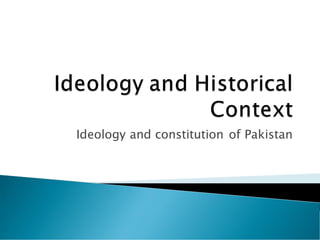Ideology and historical context.pdf nursing
•
0 likes•7 views
Pakistan study
Report
Share
Report
Share
Download to read offline

Recommended
More Related Content
Similar to Ideology and historical context.pdf nursing
Similar to Ideology and historical context.pdf nursing (20)
Recently uploaded
Mehran University Newsletter is a Quarterly Publication from Public Relations OfficeMehran University Newsletter Vol-X, Issue-I, 2024

Mehran University Newsletter Vol-X, Issue-I, 2024Mehran University of Engineering & Technology, Jamshoro
Recently uploaded (20)
Food safety_Challenges food safety laboratories_.pdf

Food safety_Challenges food safety laboratories_.pdf
Micro-Scholarship, What it is, How can it help me.pdf

Micro-Scholarship, What it is, How can it help me.pdf
HMCS Vancouver Pre-Deployment Brief - May 2024 (Web Version).pptx

HMCS Vancouver Pre-Deployment Brief - May 2024 (Web Version).pptx
Plant propagation: Sexual and Asexual propapagation.pptx

Plant propagation: Sexual and Asexual propapagation.pptx
ICT role in 21st century education and it's challenges.

ICT role in 21st century education and it's challenges.
Salient Features of India constitution especially power and functions

Salient Features of India constitution especially power and functions
Exploring_the_Narrative_Style_of_Amitav_Ghoshs_Gun_Island.pptx

Exploring_the_Narrative_Style_of_Amitav_Ghoshs_Gun_Island.pptx
HMCS Max Bernays Pre-Deployment Brief (May 2024).pptx

HMCS Max Bernays Pre-Deployment Brief (May 2024).pptx
ICT Role in 21st Century Education & its Challenges.pptx

ICT Role in 21st Century Education & its Challenges.pptx
Ideology and historical context.pdf nursing
- 1. Ideology and constitution of Pakistan
- 2. Ideology refers to a system of beliefs, values, ideas, and principles that form the basis of a particular social, political, or economic theory or policy. It is a set of interconnected concepts and assumptions about the nature of society, the role of individuals and institutions within it.
- 3. 1. Beliefs and Values: Ideologies are built on fundamental beliefs and values about human nature, society, morality, justice, and other core concepts. 2. Worldview: Ideologies offer a particular perspective or worldview through which individuals interpret events. This worldview shapes their understanding of history, politics, culture, and societal dynamics. 3. Goals and Objectives: Ideologies often articulate specific goals and objectives for society. These goals may include achieving social equality, promoting individual liberty,, or advancing a particular cultural or religious identity.
- 4. 4- Normative Principles: Ideologies provide normative principles or guidelines for how society should be structured and governed. These principles are used to design of institutions, policies, and laws. 5- Political and Social Movements: Ideologies can give rise to political and social movements that seek to promote, defend, or transform existing systems based on ideological principles.
- 5. The creation of Pakistan in 1947 is deeply rooted in historical, social, political, and religious contexts that unfolded over several decades. 1-British Colonial Rule: Britain controlled India and its neighboring regions for a long time, taking direct control in the 19th century. 2-Indian Nationalism: Indians started wanting more say in their own affairs, forming groups like the Indian National Congress to push for rights and changes
- 6. 3- Muslim Identity: Muslims in India started feeling they needed their own representation and rights, leading to the formation of the All India Muslim League. 4- Two-Nation Theory: Some Muslim leaders believed Muslims and Hindus were different nations and needed separate countries to protect their interests. 5- Bengal Partition: The British split Bengal, causing tensions among communities and highlighting religious and regional differences.
- 7. 6- Khilafat and Non-Cooperation Movements: Hindus and Muslims joined movements against British rule, but differences arose about their goals. 7- Communal Tensions: Conflicts between Hindus and Muslims increased due to economic problems, political disagreements, and religious differences. 8- Demand for Pakistan: In 1940, the Muslim League officially demanded separate Muslim- majority states based on the Two-Nation Theory, leading to the eventual partition of India into India and Pakistan in 1947.